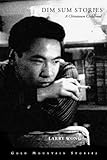Dim Sum Stories: A Chinatown Childhood
Review By LiLynn Wan
November 4, 2013
BC Studies no. 177 Spring 2013 | p. 190-91

Vancouver’s Chinatown has been the subject of numerous notable academic studies, providing a focus that has proven to be essential to the Canadian historical narrative. In analyzing the history of Vancouver’s Chinatown, scholars have made groundbreaking theoretical and methodological contributions to the literature on such topics as race relations, racial discourse, immigration, urban geography, community development, citizenship, governance, crime, colonialism, gender relations, narcotics legislation, identity politics, class relations, and economic development. Yet the task of reconstructing a past that has been obscured by racism and socio-economic marginalization can only be partially satisfied through academia. For those of us whose family histories have been lost to the tangible effects of colonialism — to the silences of our parents’ and grandparents’ generations, borne of the experiences of migration, opium, poverty, and shame — theory and methodology have their limits. Larry Wong’s Dim Sum Stories offers a warm and welcome literary meal to feed that hunger. This collection of short stories and memoirs provides an account of experiences that are specific to Wong’s childhood. At the same time, these stories tell us about the lives of multiple generations, of women and girls, of “children of immigrants,” and of Vancouverites (not just “Chinese”) who lived, worked, and shopped in Chinatown; and of the lives of the successful and those who were not so lucky.
Difference is key to the experiences of the characters brought to life in Wong’s collection. Wong’s father’s life story is one of the success of survival. Like many of the early residents of Vancouver’s Chinatown, Wong Quon Ho’s experience extended between China and Canada. It included love and loss, raising children, and operating a business. Wong Quon Ho’s life is contrasted with that of his friend, F.P. – whose story is one of a man who is ultimately consumed, both body and mind, by the sojourner experience. Wong includes carefully written descriptions of his mother, Lee Shee, who came to Vancouver from Kowloon as Wong Quon Ho’s second wife; and of his sister, Jennie, who left Chinatown and married a “Caucasian” butcher in Ontario. These narratives provide an understanding of generational as well as gendered difference in the experiences of Chinese women in Canada. Likewise, through his descriptions of his own past, Wong defines himself as Canadian, in contrast to his father’s generation and the immigrant population who moved in and out of Chinatown throughout the twentieth century. Wong’s memoirs offer a commentary on the diversity and malleability of experiences of racial oppression and socio-economic marginalization. They are presented in a way that resonates for many and, as such, this book gives substance to the scholarly narratives that have become so central to British Columbian and Canadian history.
Dim Sum Stories: A Chinatown Childhood
By Larry Wong
Vancouver: Chinese Canadian Historical Society of British Columbia, Gold Mountain Stories, 2011 144pp, $20.00
